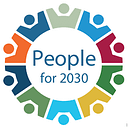From Homelessness in the Atlas Mountains to the UNDP Headquarters
Meet Itto Outini, Disability and Inclusion Intern at UNDP Office of Human Resources and get captivated by her inspiring journey, which proves that no matter the challenge a resilient spirit and a strong will can overcome anything.
It may sound peculiar coming from a Fulbright alumna and UNDP intern, but I didn’t learn to read and write until the age of seventeen. This was the year I first attended school — also the year that I was blinded, rejected by my family and ejected from my home.
Raised in the Atlas Mountains of Morocco, I’d never encountered any form of modern technology, assistive or otherwise. I still recall riding a bus for the first time at twelve years old and wondering whether it ate grass like the cows I could see out the window. After being blinded, I wasn’t just prevented from using assistive technologies because of homelessness and poverty; in truth, I didn’t know they existed at all.
I was introduced to Braille in a school for the blind and learned it in a day. Likewise, I forced myself to learn French and Standard Arabic in one semester. As soon as I’d mastered these tools, I sought refuge in stories. I neglected my body but nourished my mind, giving up sleep and food and buying books instead. With the money earned from cleaning restaurants and given by strangers who pitied me, I took the overnight bus from Azrou to Rabat, the capital, seeking someone with a Braille embosser. The man I found took every penny I’d earned but gave me books that I could read. I considered this a fair exchange.
I wouldn’t waste money on decent clothes but wrapped my books in plastic bags to keep them safe from rain. I still remember lying on the streets of Azrou and Ifrane, exposed to the elements, imagining the snowdrifts were blankets and pillows. One memory stands out especially vivid: tracing the page of a novel and feeling the heat of Miami Beach, where the story was set, creeping up my finger to warm me.
Books were how I first learned of the United Nations.
Though I’d knocked on the doors of countless non-profit organizations and met rejection time and again, I told myself I’d soon be working with the UN, telling my story to the world. I didn’t know then that I’d spend six years homeless, first in Morocco and later in Malaysia. If I had, I might not have kept going. I might not have survived at all.
For years, I sustained myself with dreams of working at the UN, but for all intents and purposes, these were but the ravings of a sightless woman on the streets. Now, fifteen years later, I hold a Master’s in journalism, earned on a Fulbright scholarship, and I work with the United Nations Development Programme, promoting disability awareness and inclusion. I’m surrounded by people who offer me the love and care I never received from my family. My colleagues may not know everything about assistive technology — indeed, no one person does — but they’ve impressed me, time and again, with their curiosity, their humility, and their eagerness to learn.
My first interview with the UNDP was also the first time an organization asked if I needed accommodation. At first, I didn’t know how to answer. All my life, I’ve had to compete with my sighted peers on their terms, never daring to ask for accommodation, devising workarounds instead. Even though I was being recruited to serve as a disability inclusion intern, it didn’t occur to me that the UNDP might want to offer me accommodation! In the past, when I’d requested it, opportunities had swiftly been withdrawn. As it turned out, though, the UNDP only wanted to make the interview process accessible — not just for me, but for all the young talent with disabilities they were recruiting.
Since I lost my sight, many institutions have attempted to mould my behaviour, identity, and self-presentation through abuse and coercion. The United Nations is one of the few that, instead of attempting to change me or co-opt my story, has embraced me as I am and shown interest in the insights I’ve gained from my strange and difficult journey. During our first meeting, although I couldn’t see my colleagues’ faces, I could hear their smiles. When one of them told me, “You’re welcome here. I hope you feel at home,” I didn’t have to wonder whether it was true. I knew it was. I’ve woken every morning since then with a smile of my own, eager to work alongside these wonderful people who’ve proven themselves committed to building a more inclusive, accessible world.
In addition to accepting me into their family, UNDP has demonstrated a real, sustained commitment to improving the lives of persons with disabilities around the world. I’ve witnessed this organization bringing out the best in people, lifting us up, supporting us as we learn and grow, and helping us navigate the challenges we face along the way. I want to thank UNDP for all the tireless work they’ve done in service of equality for everyone, and for giving me an opportunity to do the same.
